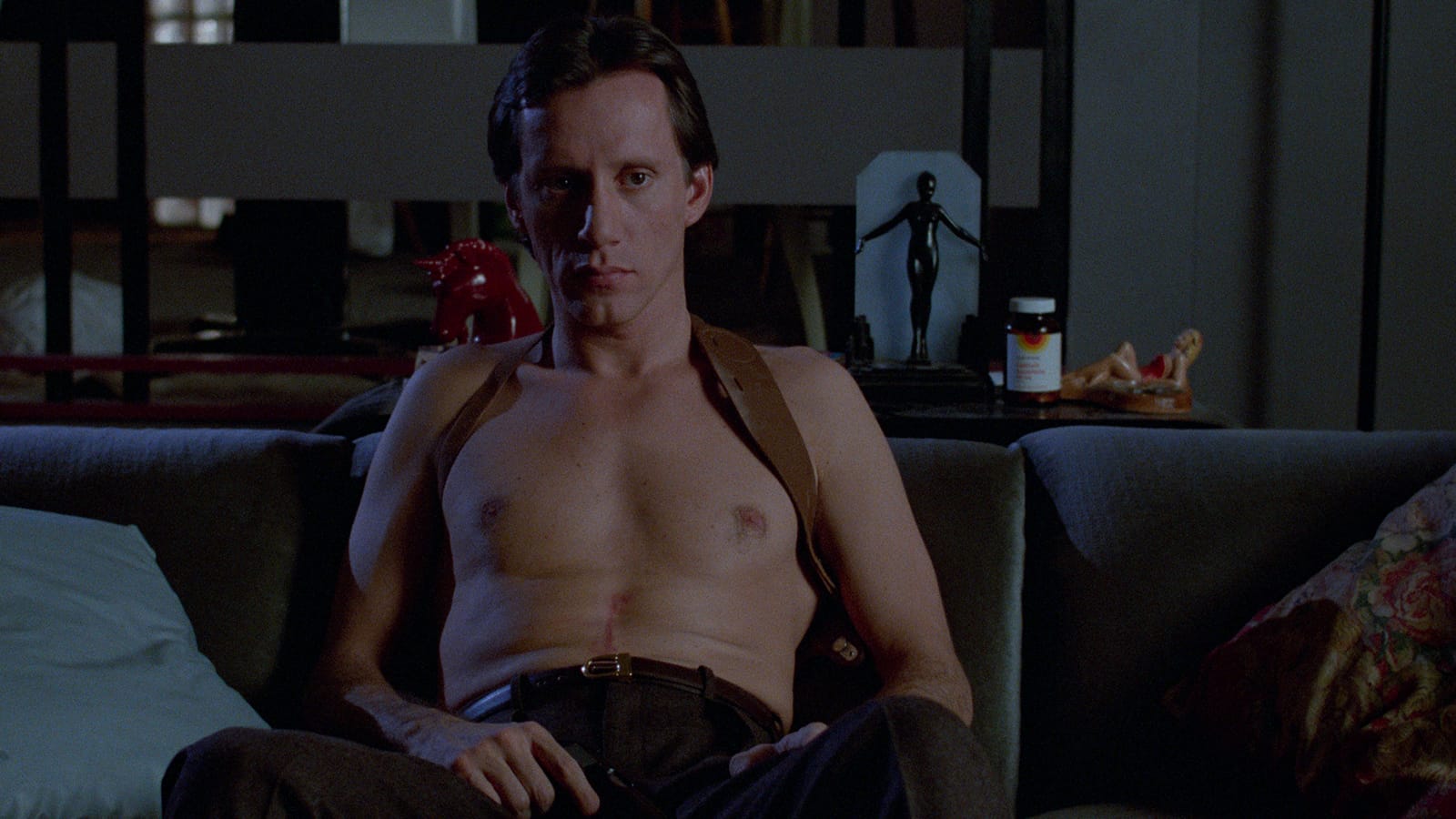Videodrome: The Slithery Sense of Unreality

“Eroticism,” Luis Buñuel told an interviewer, “is a diabolic pleasure that is related to death and rotting flesh.” No filmmaker conveys this idea with more ingenuity and macabre gusto than David Cronenberg, whose movies (hilariously, terrifyingly) illustrate the equation of penetration with contagion and infection. The great Polish writer Witold Gombrowicz, anticipating Jean-Paul Sartre’s “in itself/for itself” dichotomy by several years, identified “the interhuman” as a perpetual re-creation of identity: simply by coming into contact, you create me and I create you, as different people than we were just before we encountered each other.
Cronenberg’s dramatization of the interhuman has taken many fantastic forms, from the “game portals” drilled into people’s spines in eXistenZ (1999) to the thalidomide-induced telepathic fusion of the scanners in Scanners (1981), the talking bug typewriters and flesh-assimilating Mugwumps of Naked Lunch (1991), the genetic recomposition of the protagonist of The Fly (1986) that boosts his sexual prowess while gradually transforming him into an insect—eroticism is hardwired into our instinct, and dangerously close to the circuitry of the death wish. The sexual connection compromises and sometimes eradicates our self-preservative mechanisms. In Dead Ringers (1988), one cohesive “self” is divided between two identical bodies, and when one deviates into a discrete set of emotions and sensitivities, they both start to disintegrate. Crash (1996) conveys, viscerally, the libidinal attractions of physical injury and the scars it deposits on flesh, unfettered aggression via technology, and, to some extent, the easy portability of “love” from one arbitrary object to another.
Videodrome, prophetically for 1983 (and looking increasingly less like fiction), shows us a world of technological hyperdevelopment in which people merge with their electronic media. Like an autoimmune catastrophe, the boundary between our bodies and what’s outside them becomes indistinguishable. Like the unwary users of the hallucinogen Chew-Z, who can never come down from their trip, in Philip K. Dick’s psychedelic-era novel The Three Stigmata of Palmer Eldritch, anyone exposed to the Videodrome signal gets sucked into a never-ending hallucination controlled by someone else’s will. Whoever it goes into goes into it: it can bend the subject’s perceptions so drastically that the body itself alters form; its flesh melts into globs, sprouts machine parts, splits apart for use as a storage area. You can even patch a video into the person’s brain by inserting a cassette in his stomach. He can be programmed to kill, and he does.
Cronenberg’s films insist that human nature is no longer “natural.” People are wired together by media. Their relation to the world, each other, and themselves has nothing of primal spontaneity or ingenuousness. We are already so inextricably and involuntarily “connected” that closer contact risks the total loss of identity by the contamination of other people’s thoughts, feelings, opinions, and personalities.
Videodrome simultaneously suggests and discounts the widespread view that exposure to violent imagery desensitizes us, making us so emotionally numb that we can get sensation only from pain. While much of the film might appear to support this flawed thesis, Cronenberg undermines it entirely by revealing, through the character of Bianca O’Blivion (Sonja Smits), that the Videodrome signal can be run through any television transmission, even a test pattern, and not only via the torture-and-snuff “subterranean TV” program “Videodrome,” which Max Renn (James Woods), programmer of cable access Channel 83, has been shown by the station’s satellite-bootleg expert, Harlan (Peter Dvorsky). Violent sexual imagery is just most efficient for “opening the neural networks” and making viewers receptive. But even the Home Shopping Network will do the trick.
This disclosure indicates, among other things, that consciousness is not egregiously reshaped by watching violence on television—it’s egregiously reshaped by watching anything on television. “Television makes people stupid,” German writer Hans Magnus Enzensberger declared. One could qualify this by comparing TV with the Videodrome signal: the more exposure a person gets, the more protracted and ultimately permanent the state of hallucination becomes. The average U.S. television viewer spends five to six hours a day staring into the image-display window of a home appliance. If he or she happens to work on a computer, almost all waking hours are spent looking at a screen and living vicariously in two-dimensional space.
The sadomasochistic imagery in Videodrome is nothing most urban adults in Western societies haven’t seen or enacted—burning flesh with cigarettes, piercing it with needles, whipping, etc. (Deborah Harry, as Max’s new girlfriend, Nicki Brand, gives a smartly nuanced performance, besides serving as an ashtray and pincushion.) Because we are told that the “contestants” on “Videodrome” are chained to an electrified wall and strangled at the end of their torture session, however, the program seems scarier and more extreme than it looks.
The more drastic and disturbing images are those that show Max’s stomach turning into a vaginal slit; a pistol fusing to his suddenly bloated, deformed hand and fixing itself to his wrist with metal rods; the fascistic Videodrome conspirator Barry Convex (Les Carlson) inserting a pulsating, breathing video into Max’s cavity; and the cavity gripping Harlan’s wrist and melting his hand off after Bianca O’Blivion has “counterprogrammed” Max to wage war against Videodrome, to accomplish the triumph of “the new flesh.” These scenes are far more shocking than the television show “Videodrome” itself, but even if someone wanted to “try this at home,” they obviously couldn’t.
Videodrome, which gives the term open-minded an archly ironic meaning, is open-minded in the more familiar colloquial sense. Cronenberg’s film is intricately woven through with ambivalence about the issues it raises—though if anyone has the right to be pedantic about them, it is David Cronenberg. The apocalyptic premise, (beautifully) horrific images, and understated, sinister score by Howard Shore don’t at all disguise the intelligent, reflective approach Cronenberg takes in this vastly entertaining, funny, chillingly sexy meditation on mass media and its effects.
This piece originally appeared in the Criterion Collection’s 2004 DVD edition
of Videodrome.




